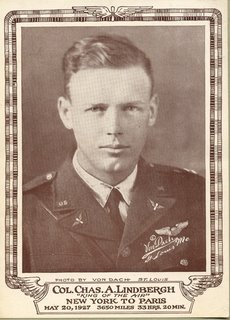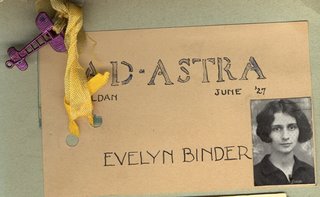One subject of our discussion was the contrast between the future, when it was unknown, and our view of a known history that has happened already. Throughout the book, the narrator, "Philip," makes clear that his telling of the story occurs years later, probably as late as around 2000 when the non-fictitious author Roth wrote the book. This retrospective stand, of course, lines up with the reader's point of view. Explicitly and indirectly, we are made aware that the as events in the book take place, no one had to be aware of the fate of 6,000,000 Jews because, in fact, perhaps their extermination was not inevitable. By presenting an alternate reality that's worse than history, he also brings up the possiblity that there was a better possible future that also did not happen.
Evidently, the bookclub spent some time discussing the fictitious and the historical Charles Lindbergh. This is particularly interesting to me, because my mother was a senior in high school in May, 1927, when Lindbergh flew across the Atlantic and became a national hero. (Perhaps a hero like no other in our history.) And when his betrayal of America was also still an unknown possibility.

In going over my mother's high school scrapbook I found the above photo of Lindbergh in 1927: before he became a supporter and defender of Nazi Germany.
 It's pasted into her scrapbook opposite a name tag with a little model of his airplane and her photo. Her class motto, "Ad Astra: To the Stars," was quickly associated with Lindbergh's flight. What disappointments lay ahead of them!
It's pasted into her scrapbook opposite a name tag with a little model of his airplane and her photo. Her class motto, "Ad Astra: To the Stars," was quickly associated with Lindbergh's flight. What disappointments lay ahead of them!My mother sometimes mentioned the excitement of hearing of Lindbergh's flight, and the hero worship of her classmates -- and also his later politics. So Roth's book especially speaks to me of the failure of that heroic Lindbergh who inspired my mother and her peers. Roth forces us to deal with this failure. When Lindbergh accepted Nazi honors, defended Hitler's policies, and tried to prevent us from entering the war in Europe, he failed America.
I have posted more pictures from my mother's album: The Girl Graduate's Record Book
No comments:
Post a Comment